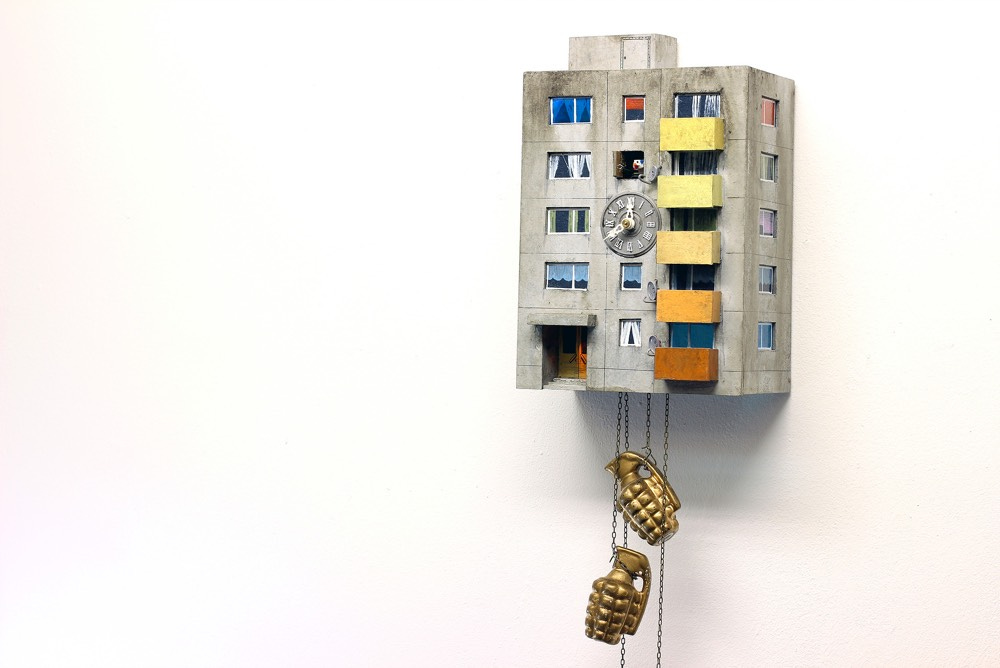#79: Everything's Writers Rooms

Artist Lydia Ricci collects scraps and sculpts them into everyday objects.
Happy Friday!
This is necessarily going to be a super short email: I've more than enough typing for one week on Foiled and I haven't slept in a bed for a few nights - the glamour!
One particular highlight of the last 7 days was realising on Wednesday that our producer wanted a rewrite of one episode by 9pm - at 8.40pm. I still don't know how I managed to write 8 pages in 20 minutes - and only half of it was chucked out the next day!
Maybe we should work like that more often - it was our producer's favourite of the 4 episodes.
Our two days of writers room work was an absolute joy. We're privileged as all hell to have producers who actually care about the quality of these scripts, and who throw a heroic amount of energy behind the project.
We're unbelievably lucky to have spent two whole days with half a dozen other comedians, crawling through the scripts with a funny-bone tooth-comb. The result is 3 scripts that are in superb shape, with solid plots and buckets of lols.
(And 1 script that's a total mess, completely gutted and with only the vaguest semblances of funny. But we've still got 3 weeks, right?)
Onwards!
BIKES!
Celebrate UN World Bicycle Day on 3 June with - what else? - a bike ride!
Start: The Bike Project Workshop, Arches 223–224 Edward Street, SE8 5HD
Date: THIS SUNDAY 3 June
Time: 11am
Destination: Thames Barrier (close to Charlton station)
Distance: 6 miles
Weather: SUNSHINE!!! (maybe)
Bring: Your bike and some food to share for a little picnic
OUTPUT >>
As you may have noticed, this mailing list is the engine room of my blogging. Here's some you might have missed:
Ultimate Medal Hope (May)
Sunswim (May)
...COMING UP...
World Bike Day!
Rewriting Foiled
Seaside
Now On: The Victor Frankl 5-a-day Book Club!
Membership Criteria: Read 5 pages a day of Man's Search for Meaning to complete the whole darn text in only 28 days. I'll be tootling through the text at just 5 pages a week, so you've got plenty of time to catch up.
Day 5, p31-37
In this section, Frankl moves onto the second phase of the psychological response to incarceration: apathy, a 'kind of emotional death'. As he says, such an 'abnormal reaction to an abnormal situation is normal behaviour'.
This 'mortification of normal reactions was hastened' by the punishments meted out by the camp officials:
It was a favourite practice to detail a new arrival to a work group whose job was to clean the latrines and remove the sewage. If, as usually happened, some of the excrement splashed into his face during its transport over bumpy fields, any sign of disgust by the prisoner or any attempt to wipe off the filth would only be punished with a blow from a Capo.
This learned apathy developed to such an extent that inmates would stand unmoved while a twelve-year-old boy had his gangrenous frostbitten toes plucked off one-by-one with tweezers. 'Disgust, horror and pity are emotions that our spectator could not really feel any more.'
This apathy was actually a 'very necessary protective shell' against the injustices and despair of camp life. Apathy protected Frankl and other inmates against the psychological torment of 'daily and hourly beatings' that occurred 'on the slightest provocation, sometimes for no reason at all'.
In these cases, Frankl says that 'it is not the physical pain which hurts most ... it is the mental agony caused by the injustice, the unreasonableness of it all'. As he writes later: 'The most painful part of beatings is the insult which they imply.'
Frankl recalls an incident in which he was spotted pausing to catch his breath while working hard on a railway track in a snowstorm.
That guard did not think it worth his while to say anything, not even a swear word, to the ragged, emaciated figure standing before him, which probably reminded him only vaguely of a human form. Instead, he playfully picked up a stone and threw it at me. That, to me, seemed the way to attract the attention of a beast, to call a domestic animal back to its job, a creature with which you have so little in common that you do not even punish it.
The abnormality of apathy was, in this situation, not only a normal reaction, but essential self-preservation.
---
Share your thoughts by replying to this email, or adding to the comments on my blog. We will continue next week...
Sorry, guys - we out - back to Episode 4!
Much love,
- dc
CREDITS
David Charles wrote this. When not writing this, David co-writes BBC Radio sitcom Foiled, does copywriting for The Bike Project and the Elevate Festival, and volunteers for refugee youth club Young Roots. He is almost always available for work. Lazy sod. davidcharles.info // @dcisbusy

Brutalist Cuckoo Clocks. Life complete. Via Kottke.org.


